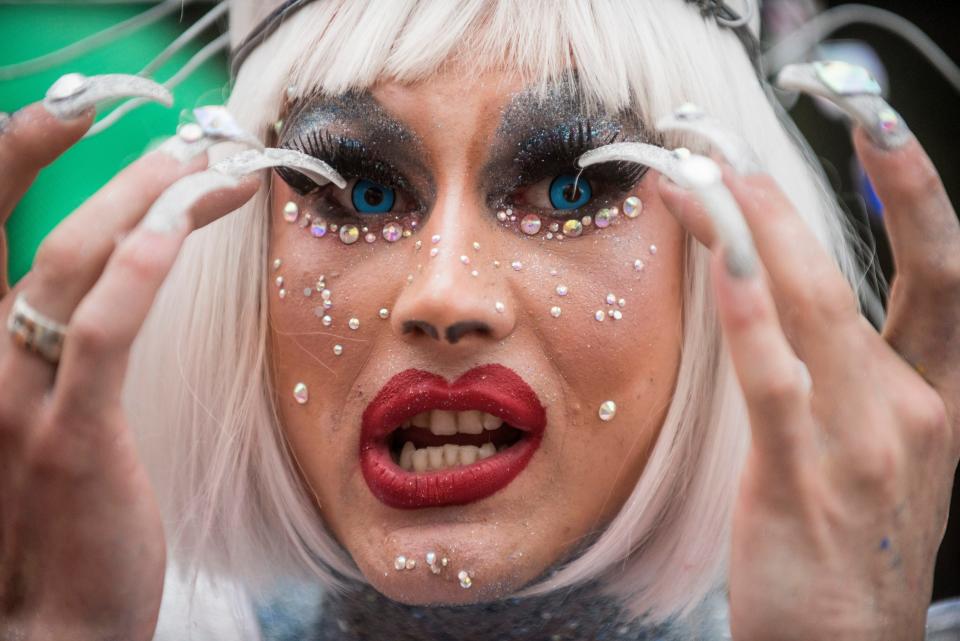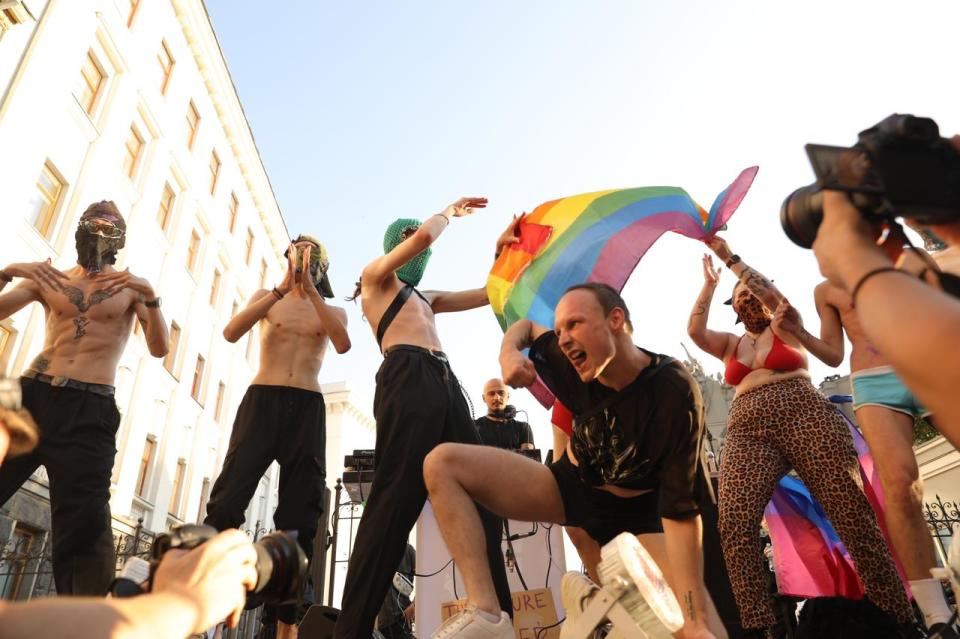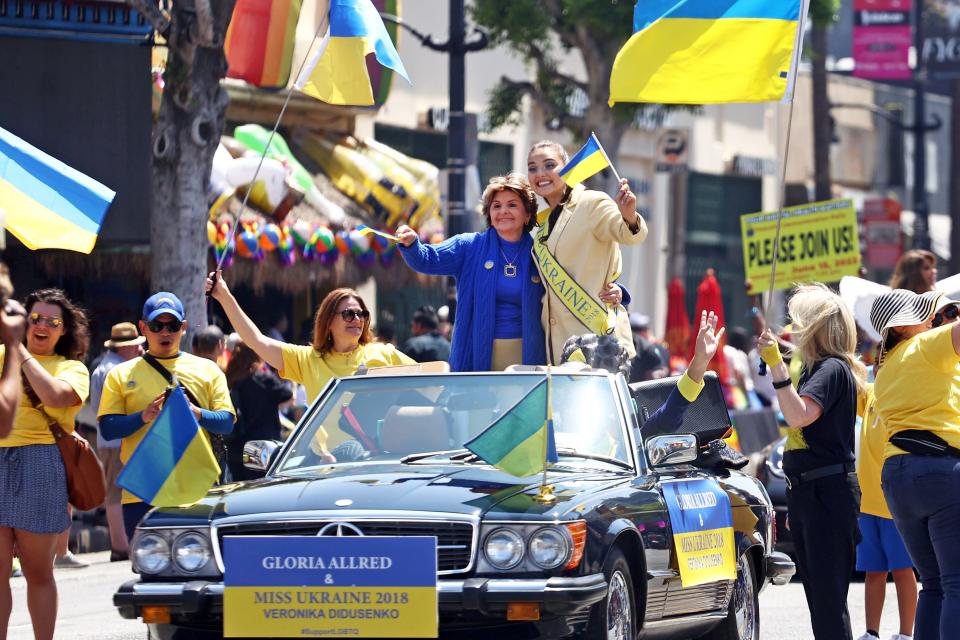Ukraine was the 'queer capital of Eastern Europe.' Russia's war changed everything.
For a long time, Yuriy Dvizhon was afraid to come out as a gay man in Ukraine. But in recent years he has seen much younger people reveal their true identities without shame, fueled by what they saw as a cultural revolution that was helping to make LGBTQ civil rights more mainstream.
“I see a lot of my friends who are 18, 16 or 20 years old, they’re coming out to their families very often, not like when I was 18,” said Dvizhon, 29.
Those gains have quickly been eroded by Russia’s ongoing attack on Ukraine. The official Pride parade in Kyiv was canceled this year after a decade of hard-fought efforts for more acceptance of LGBTQ people; Ukraine’s role as a safe haven for LGBTQ Russians has been cut short by border conflicts; and many Ukrainians have been forced to relocate to Poland, a nation considered far worse for LGBTQ civil rights, according to European human rights groups.
Before Russia invaded, Ukraine, a largely religious nation with a long history of oppression against sexual and gender expression, had increasingly become a rare bright spot for LGBTQ rights and a sanctuary of sorts for Eastern Europe and ex-Soviet LGBTQ individuals who would travel to experience a gay nightclub scene, especially in larger cities like Kyiv, Kharkiv and Odesa, where they could feel safer to be open.
“Ukraine became a shelter and home for a lot of LGBTQ+ foreigners from ex-USSR countries because here we have much more freedom than Georgia, Kazakhstan, Belarus, Russia, Uzbekistan or other countries that were in the USSR,” said Dvizhon, creative director of UKRAINEPRIDE, an NGO fostering the queer movement in Ukraine. “We had a lot and I hope we will rebuild it.”

Now, what would have been the 10th anniversary of the “Equality March” in Kyiv this month was relocated to Poland because of the ongoing war. Ukrainian organizers of KyivPride will join with WarsawPride to march on June 25, and expect tens of thousands of participants to stand for peace, victory and freedom, according to a statement from the organizers.
The marchers “are not celebrating,” said Lenny Emson, director of KyivPride, in a statement, but making an appeal to the world to help the Ukrainian people live freely on their land.
Ukraine a limited haven for LGBTQ rights in Eastern Europe
To be sure, many LGBTQ Ukrainians enjoyed limited civil rights compared to many LGBTQ people living in progressive communities in the United States.
Being LGBTQ is legal in Ukraine, but same-sex marriage is not, and many of the rights and benefits that come through such legally-recognized partnerships are withheld from LGBTQ couples.
Ukraine was ranked 39 out of 49 countries of LGBTQ human rights in 2021 by ILGA-Europe, an advocacy group also known as the International Lesbian, Gay, Bisexual, Trans and Intersex Association. Russia came in 46th and Poland 44th.
A 2019 Pew Research Center survey found 69% of Ukrainians said same-sex relationships should not be accepted by society while only 14% said it should.
Those numbers are somewhat similar to Russia, where LGBTQ people have been marginalized and aspects of it criminalized, in that 74% said same-sex relationships should not be accepted by society and 14% said it should.
In contrast, in the United States, 72% said same-sex relationships should be accepted by society.
Russian President Vladimir Putin has aligned himself with the Russian Orthodox Church and for years has used the language of so-called traditional values to portray LGBTQ rights as degrading to Russian society. He did so again in his speech leading up to the invasion of Ukraine, where he spoke about the West’s effort to “destroy our traditional values” by imposing “attitudes that are directly leading to degradation and degeneration, because they are contrary to human nature.”
In Ukraine, the 2014 Maidan Revolution led the country toward more openness as Pride gatherings grew across multiple cities, with attendees in Kyiv rising from 100 people in 2015 to as many as 9,000 people in 2019, said Dvizhon, of UKRAINEPRIDE.
While Pride in many Western countries is more of a celebration, in Ukraine Pride hews closer to its roots as a riot against oppressive government in that the gathering is still very much a push for recognition and broader acceptance, said Alem Kent, 25, a Crimean Tatar-American journalist who has lived large portions of her life in Ukraine. She called Kyiv the “queer capital of Eastern Europe” and recalls meeting Polish visitors at a club who said they wished they had such spaces in their country.
Still, Ukraine wasn't exactly nirvana for queer people, many of whom can easily rattle off stories of violence against friends because of their sexual orientation.
“This (war) will have a massive impact on the rights movement broadly,” said Devon Matthews, director of programs at Rainbow Railroad, a Toronto-based charity that helps LGBTQ people escape state-sponsored violence and has been working to help Ukrainians.
Matthews said the country’s baseline existence for LGBTQ individuals has been “marginalization, full stop,” – with concerns about freedom of speech and assembly for queer individuals.
“People were surviving and not thriving in Ukraine prior to the war,” Matthews said.
In Russian-occupied areas in Ukraine, persecution is already significantly worse against the LGBTQ community, Matthews said, because people must hide their identities from Russian soldiers as well as their own communities, and are dealing with the fear of persecution on multiple fronts.
She noted that LGBTQ groups must often shift immediately during a conflict from pushing to move rights forward to providing crisis response services to people who, for example, cannot get their crucial hormonal or HIV medicine.
“It’s like taking the entire movement and stalling it at the best-case scenario,” Matthews said. “At the worst, what does a Pride movement or rights or legal battle look like after this war? … The far-right movement and Orthodox Church in particular in Ukraine were violent and threatening to the community prior to this crisis, but they will be emboldened for sure.”
Matthews said even if the average Ukrainian was able to escape to Poland, “Poland isn’t an LGBTQI haven of any means, especially when municipalities have declared themselves LGBTQI-free zones,” referring to lesbian, gay, bisexual, transgender, queer and intersex people.
It’s also worse for LGBTQ Russians, said Matthews, who could previously flee to Ukraine as a safe haven and have been blocked in recent months from doing that. She said requests for help from Russian LGBTQ individuals have also increased substantially since the start of the war.
LGBTQ rights were becoming more mainstream before war
Others have also warned about the impact of Russia’s war on the Ukrainian LGBTQ community.
Victor Madrigal-Borloz, the United Nation’s independent expert on protection from violence and discrimination based on sexual orientation and gender identity, said in a statement that Russia’s war “will destroy decades of progress in the fight against discrimination and violence based on sexual orientation and gender identity in law, in access to justice, and in public policy, including the health, education, employment and housing sectors.”
Yvonne Su, an assistant professor of equity studies at York University in Toronto who specializes in queer migration, has traveled to Europe during the war to speak to LGBTQ activists and has been in touch with many active in Ukraine. She said many Ukrainians have come out of the closet due to the existential threat they have experienced during wartime, but also because of lockdown from martial law, which has made it harder to hide their queer selves from family.
Still, others have had to hide their true identities while traveling or displaced internally in Ukraine. The United Nations estimates one-third of Ukrainians have been forced from their homes since Feb. 24 and about 7 million people are displaced internally.
“In theory, there are a lot of LGBT friendly policies” in Ukraine, said Su, adding that the reality is different because, for example, while it is legal to be trans, it’s also classified as a disorder.

With Ukraine’s recent application to join the European Union, it’s past time for the country to prioritize LGBTQ rights, said Tymur Lysenko, an emergency consultant with Berlin-based TGEU, an organization backed by the European Union, Council of Europe and the Netherlands government, among others, that works on transgender issues across the EU.
“There is some work the country should do before” gaining EU membership, Lysenko said. He noted that there is always a reason to de-prioritize LGBTQ rights, such as prior to the war, when the country was dealing with a difficult economy.
“In the war and during wartime, it cannot be the first priority, but still, it should be a focus,” Lysenko said.
But some saw hope for LGBTQ rights in Ukraine before the war.
For Dvizhon, who is also a film director, he noted breakthrough moments in Ukraine’s entertainment industry, with more gay characters on television and singers coming out publicly. And as recently as January 2018, a popular Ukrainian television station was forced to apologize and delete scenes of a gay-bashing Pinocchio parody show performed by a comedy troop led by now-Ukrainian President Volodomyr Zelenskyy.
More recently, UKRAINEPRIDE was working to persuade lawmakers to pass a bill that would have recognized hate crimes motivated by sexual orientation and gender identity, in addition to racial, national or religious intolerance.
“You see such big progress in these four years, from these jokes to the trend that homophobia is not cool in general,” Dvizhon said. “Now, homophobia, it’s not OK to speak about gay people in a bad way or say that it’s a sin” at least in public.
Dvizhon said the changes had helped him feel like he was in a more tolerant Western nation, with the massive numbers of foreigners working in the IT community and bringing their more progressive values to the entertainment business and Kyiv nightclubs on the weekend.
“It’s sad to see how everything changed because of Russia,” Dvizhon said. “A lot of these people left Ukraine when everything started.”

Dvizhon said those who have remained will continue to defend LGBTQ rights. This Pride month, UKRAINEPRIDE helped release a six-day audio course on a mental health app that highlights personal stories of queer Ukrainians, including a member of the military, to help educate the public.
“Our society is getting more aware of different things in our life and getting modern,” Dvizhon said.
And in some ways, the scattering of Ukrainians across Europe – some leaving Ukraine for the first time – has also helped shake up older ways of thinking.
“A lot of people are visiting Europe or the United States, they’re having their unique experience,” Dvizhon said. “I hope that they will bring this experience back to their life when they’re back in Ukraine, when this war is over.”
This article originally appeared on USA TODAY: Ukraine pride parade canceled amid Russian war

